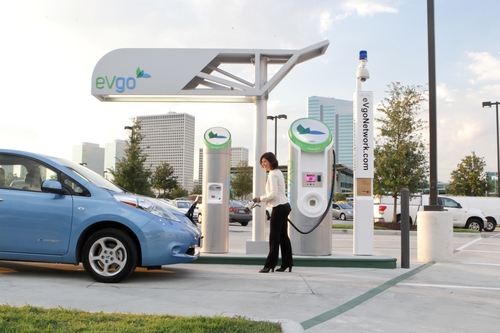Is the primary hurdle to buying electric cars the purchase price, or the lack of public charging infrastructure? A couple weeks ago I referred to research saying it’s the purchase price, that prospective electric car buyers don’t want to pay a price premium for electric cars. New research by a pair of researchers at Cornell University suggests that, instead, it’s the lack of public charging infrastructure.
The electric car price premium is an important factor, and the NSF press release describing the Cornell research also quotes a Dept of Energy spokesperson saying “While the market is growing quickly, additional cost reduction of electric vehicle technology is required to directly compete on a cost basis with conventional vehicles,” says DOE’s Deputy Assistant Secretary for Transportation Rueben Sarkar.
The Cornell researchers note that in cities with more electric cars there are more charging stations. They suggest a 10% increase in the number of charging stations per million people in a city would result in a 10.8 percent increase in the market share of electric vehicles in that city.
While I agree that more charging stations would make EV purchases more likely — the buyers want to know they can drive around and rely on charging infrastructure — I’m not sure I buy their reasoning.
If A and B are both true does that mean A caused B? That’s what their claim is, that more charging stations cause people to buy more electric cars. Is that true?
It is also true that some regions are more amenable to electric cars than other regions, e.g. us Californians want our clean energy gizmos, and that charging station network operators saw strong EV sales in a region as a sign they should build more charging stations.
In any case, as the press release notes it’s not just a matter of throwing dollars at building more charging stations. We, the EV drivers of the world, need charging stations in convenient useful locations, not scattered willy-nilly. The latter has been tried, throwing government grant dollars at anyone willing to install charging stations, and the result wasn’t satisfactory.
The researchers are additionally looking into methods to reduce the cost of the charging station infrastructure, so that more infrastructure can be built with the same investment dollars. This includes solar panels in conjunction with charging stations, as well as an Intelligent Energy Management System to manage the charge rates of multiple charging stations at a given location.
More info is on the NSF website![]() …
…
- Highway design could decrease death and injury risk, if “we” chose smarter designs - March 28, 2015
- GM really did trademark “range anxiety”, only later to abandon that mark - March 25, 2015
- US Government releases new regulations on hydraulic fracturing, that some call “toothless” - March 20, 2015
- Tesla Motors magic pill to solve range anxiety doesn’t quite instill range confidence - March 19, 2015
- Update on Galena IL oil train – 21 cars involved, which were the supposedly safer CP1232 design - March 7, 2015
- Another oil bomb train – why are they shipping crude oil by train? – Symptoms of fossil fuel addiction - March 6, 2015
- Chevron relinquishes fracking in Romania, as part of broader pull-out from Eastern European fracking operations - February 22, 2015
- Answer anti- electric car articles with truth and pride – truth outshines all distortions - February 19, 2015
- Apple taking big risk on developing a car? Please, Apple, don’t go there! - February 16, 2015
- Toyota, Nissan, Honda working on Japanese fuel cell infrastructure for Japanese government - February 12, 2015












